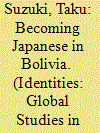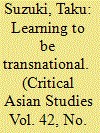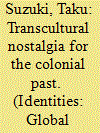| Srl | Item |
| 1 |
ID:
073443


|
|
|
|
|
| Publication |
2006.
|
| Summary/Abstract |
This article chronicles the changing subject-positions of Okinawans in Bolivia from the 1950s to 1990s, who migrated to Colonia Okinawa, an agricultural settlement in the eastern Santa Cruz region, as sponsored migrants backed by the United States military administration and the Okinawan (Ry?ky?) government. Since the forced annexation of Okinawa by Imperial Japan in 1879, Okinawans and the Okinawan Diaspora have often been discriminated against by the Japanese government and the immigrants from mainland Japan as illegitimate Japanese national subjects. The lack of active intervention by the Japanese government and the virtual absence of Japanese mainlanders in the settlement, however, enabled the Okinawan settlers to maintain their Okinawan cultural identities and practices without being questioned about their legitimacy as Japanese. Underscored by their socioeconomic success as large-scale farm owners who employed the locals as inexpensive laborers, the settlers gradually shifted their primary identification from "Okinawan" to "Japanese" in the particular social contexts of Colonia Okinawa. The settlers' concern about their children's cultural assimilation into the local Bolivian population led them to stress the Japanese-Bolivian polarity, while relegating the troubled history between Japan and Okinawa into the background. As a result, Okinawans in Colonia Okinawa, despite their status as formerly colonized subjects under Imperial Japan, "became" Japanese-vis-à-vis local Bolivians-without culturally becoming as one.
|
|
|
|
|
|
|
|
|
|
|
|
|
|
|
|
| 2 |
ID:
094001


|
|
|
|
|
| Publication |
2010.
|
| Summary/Abstract |
Scholars and practitioners of heritage language education commonly hold two assumptions about heritage language: first, that heritage language is an official national language of a nation-state from which group originally migrated; and second, that heritage language is a vulnerable language on the verge of getting swept away by the national language of the nation-state of a migrant's current residence. This article questions these two assumptions by examining Japanese language education and speech practices among Okinawan-Bolivians in a rural agricultural community called Colonia Okinawa. Okinawan-Bolivians' heritage language education and speech practices suggest that immigrants who were marginalized in the nation-states of their migratory/ancestral origin, like Okinawans, consciously transform their linguistic heritage from a sub-national one to a national one in order to gain socioeconomic advantages in their migratory destination. Furthermore, when immigrant community leaders deem the international standing of the country of their migratory origin higher than their host country's status, such as Okinawan- Bolivian leaders in Colonia Okinawa, they regard heritage language education as a crucial means to maintain their community members' political, economic, and symbolic powers over other local residents. By ethnographically portraying the ways in which Japanese is taught and spoken in Colonia Okinawa, this article highlights the shifting scales and locations of the immigrant community's "ancestral homeland" and draws attention to the multiple meanings of the language the community designates as its "heritage."
|
|
|
|
|
|
|
|
|
|
|
|
|
|
|
|
| 3 |
ID:
179012


|
|
|
|
|
| Summary/Abstract |
This study examines how different cultural groups forge a shared longing for the past, or transcultural nostalgia. The article suggests that each group’s past and present political-economic conditions are key contributors to transcultural nostalgia. Furthermore, it suggests that travel between spaces is a key means of transcultural remembering. It historically and ethnographically examines the transcultural nostalgia among Okinawans who had migrated to the Northern Mariana Islands under the Japanese rule and repatriated after WWII and the indigenous islanders who had grown up as Japanese colonial subjects, as well as the repatriates’ post-war ‘spirit-consoling’ pilgrimages to the Marianas.
|
|
|
|
|
|
|
|
|
|
|
|
|
|
|
|